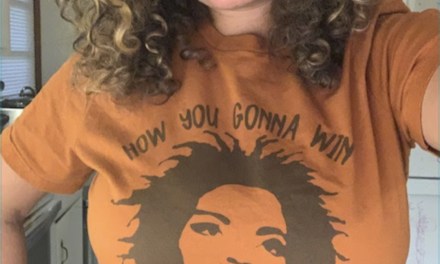By Tina Madison White for Asheville View, May 6, 2022
In part of a series, Tina White explores some of the hidden toxins at work in our community.
One of the reasons I moved to Asheville six years ago was to escape my binary past. When, in 2013, I transitioned from Tom to Tina, the duality of my life came to define me. Even those who fully supported my transition had difficulty thinking of me except in the context of that transition. Which, they wanted to know, was the real me? Which was the fake?
By moving to a new city, I hoped that I might escape this. People would simply know me as Tina. Once again, I could enter a room, a single person.
Don’t misunderstand: I didn’t try to hide my past. My past, I felt, was nothing to be ashamed of. This notion – that I need not be ashamed – had come to me as a revelation.
Shame, I realized, had hitherto been the defining force in my life. Shame had led me to give power to other people and institutions. It had led me to continually demean and question myself. It had led me to a life rooted in fear.
Shame, I realized, had led me to bury my most God-given quality: my Self. I had taken God’s greatest gift and hidden it from the world.
I vowed never to do so again. I am proud of the me that God has created. If some in society choose to regard me as a leper, I would be God’s proud leper. God’s proud, beautiful leper. And, if beauty is in the eye of the beholder, I realized, so too is leprousness. Those who could only see a leper in me were the true lepers.
It was at this time that I began to explore what it means to be queer. At first, I was intimidated. The word was then dividing the LGBTQ community: was queer a demeaning slur or an empowering declaration?
It was a queer priest from New York who helped me to see past this debate. In her book, Queer Virtue, Rev. Elizabeth Edman contends that “queer” is not only compatible with Christianity, it lies at Christianity’s heart. Christ, she points out, queered all sorts of binaries: between life and death, God and man, Jew and gentile. Christ is all about querying the man-made notions that divide us.
To “queer an idea” is to play with it, especially with its boundaries. It is to question distinctions that have hitherto been taken for granted. To call myself queer is to free myself from the tyranny of a false binary: that between supposedly predetermined male and female gender identities.
Freeing as this was, I began to realize that society continues to straight-jacket me with other binaries. Every day, I am called to task by my community to define my identity in terms of opposites. Am I for or against the police? Am I in favor of corporations or against them? Am I a Republican or Democrat? If I am a Democrat, am I a centrist or a progressive?
Am I for or against the environment? Reproductive rights? Am I pro-religion or anti-religion? Do I believe that Pride events should be rooted in protest or in community outreach?
The underlying issues are real. The binary alternatives are not.
I began to see false binaries everywhere, even within the queer community. My queer friends may defend the notion of a gender spectrum. But they are as prone as anyone to see other things in society as binary. “You’re with me, or you’re against me.”
When people offer me binary choices, they are doing more than dumbing down our discussion. They are preparing to shame me. They are suggesting that my answer defines my identity and my worth as a human. They are suggesting that it defines my loyalties and my circle of friends.
I want no part of anyone’s false binary. If it is wrong to force me to choose between two arbitrary gender stereotypes, how is it OK to force me to choose between other artificially constructed options?
One of the problems with false binaries is that, while we can readily point them out in others, we tend to be blind to them in ourselves. Our cause, after all, is righteous. How can anyone not be on our side?
My first challenge, dear reader, is this: as you go through your day, look at the information you take in. Look at the headlines and posts you read. Look at your political junk mail. How often are you asked to define yourself in terms of someone else’s binary? How often do you impose binaries of your own?
Finally, how often are these binaries rooted in notions of shame and superiority?














